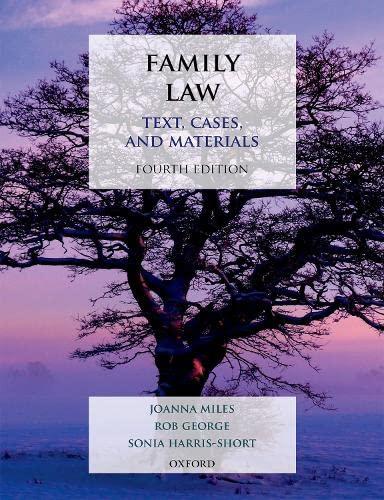Question
Answer the multiole choice please thank you 1. In Canadian society, laws ______________. a. are mandatory b. are an asset of legally enforceable rules c.
Answer the multiole choice please thank you
1. In Canadian society, laws ______________. a. are mandatory
b. are an asset of legally enforceable rules
c. involve a detailed system of consequences d. all of the above
2. One of the main purposes of the legal system is to protect society. This reflected in what type of law?
a. tort law
b criminal law
c. constitutional law
d. administrative law
3. In private law, what is the person bringing the lawsuit forward called?
a. plaintiff
b. defendant c. prosecutor d. accused
4. What is the term for a legal decision that becomes an example for similar cases that follow?
a. a verdict
b. an appeal
c. a precedent d. an exemplar
5. Which famous document, signed by King john in 1215, made everyone, regardless of their position or rank in society, subject to the rule of law?
a. the Universal declaration of Rights b. habeas corpus
c. the Magna Carta
d. the Justinian Code
6. Common law is based on the ____________. a. rule of law
b. writ of habeas corpus
c. codification of laws
d. rule of precedent
7. Section 33 of the Charter contains the _________ a. reasonable limits clause
b. equality rights section
c. notwithstanding clause
d. declaration of the rights of man and of the citizen
8. What is the first question that must be asked when analyzing potential Charter case?
a. Is there an infringement?
b. Does the Charter apply?
c. Should the law be read down?
d. Should the law be struck down?
9. Fear of spreading hate has been used by courts as a reason to limit which Charter right?
a. freedom of religion
b. freedom of association
c. freedom expression
d. freedom of conscience
10. Protection from discrimination is reflected in what section of the Charter?
a. democratic rights
b. legal rights
c. mobility rights
d. equality rights
11. Is someone believes that one or more of their Charter rights have been interfered with, what may they ask for?
a. a remedy b. a verdict. c. a resolution d. a reward
12. When judges put their own personal views into judgments, this is known as what?
a. precedent
b. judicial remedy
c. judicial activism
d. statute law
13. This type of law outlines the structures and powers of the federal and provincial governments.
a. administrative
b. procedural
c. substantive
d. constitutional
14. The reference for a legal case is called a _________ a. citation
b. report
c. record
d. reference
15. One of the flaws of the Bill of Rights corrected by the Charter of Rights and freedoms was _________.
a. it was not entrenched in the constitution b. the rights were also statutes
c. it applied to all provinces except Quebec d. none of the above.
16. Which of the following rights can the Notwithstanding Clause be used for?
a. mobility rights
b. equality rights
c. political rights
d. language minority rights.
17. Unintentional discrimination is sometimes called _______. a. differential treatment
b. adverse effect discrimination c. systemic discrimination
d. none of the above.
18. Francis, who lives in Toronto, is fired by the bank he works in allegedly because of his incompetency. He knows this is not the case but because he is gay. Which document could he use to challenge this grievance?
a. Ontario Human rights Code
b. Charter of rights and Freedoms
c. Bill of Rights
d. Canadian Human Rights Act
19. Human rights deal strictly with ____________ a. equity
b. equality
c, civility
d. discrimination
20. Political rights are also known as ___________ a. voting rights
b. democratic rights
c. civil rights
d. citizen rights
Step by Step Solution
There are 3 Steps involved in it
Step: 1

Get Instant Access to Expert-Tailored Solutions
See step-by-step solutions with expert insights and AI powered tools for academic success
Step: 2

Step: 3

Ace Your Homework with AI
Get the answers you need in no time with our AI-driven, step-by-step assistance
Get Started


